Unit4 Why don't you talk to your parents?Section A (教案)(共三课时)
文档属性
| 名称 | Unit4 Why don't you talk to your parents?Section A (教案)(共三课时) | 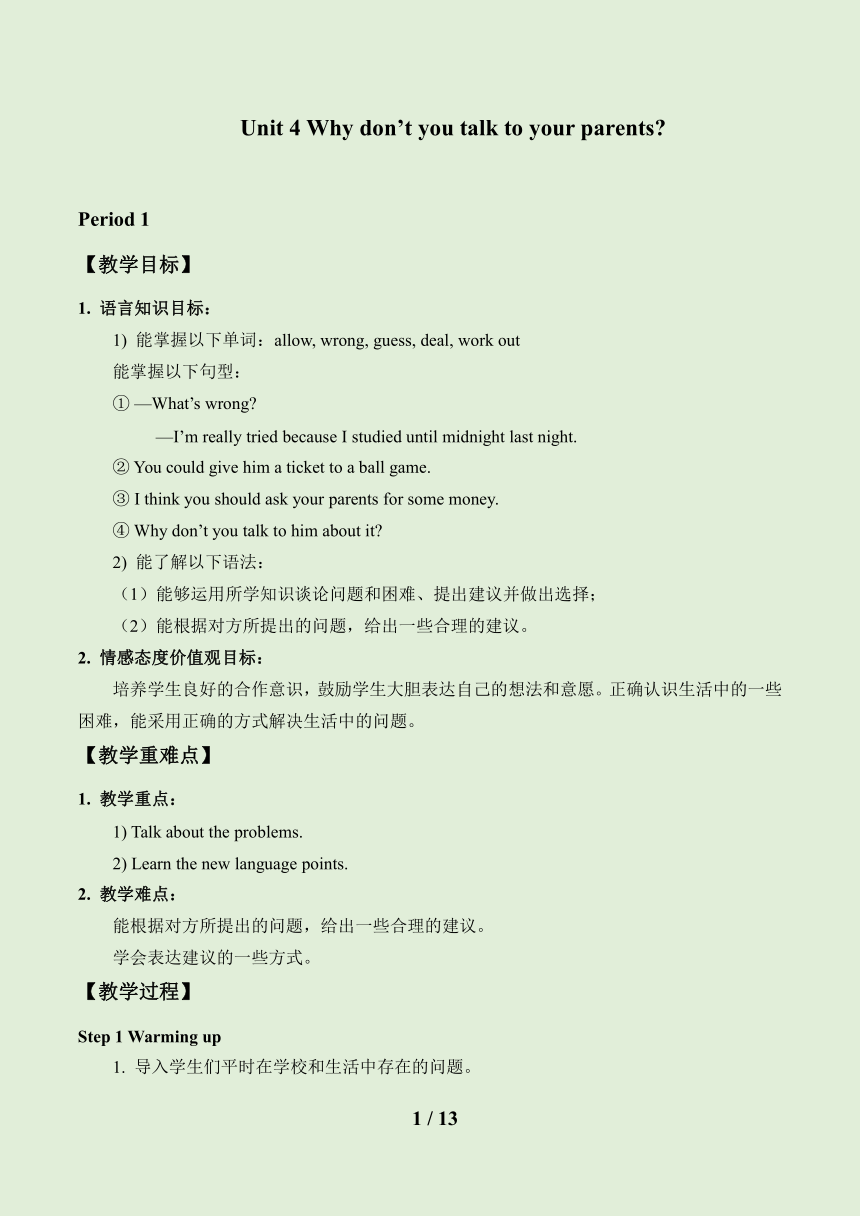 | |
| 格式 | doc | ||
| 文件大小 | 98.0KB | ||
| 资源类型 | 教案 | ||
| 版本资源 | 人教新目标(Go for it)版 | ||
| 科目 | 英语 | ||
| 更新时间 | 2022-03-23 20:48:34 | ||
图片预览

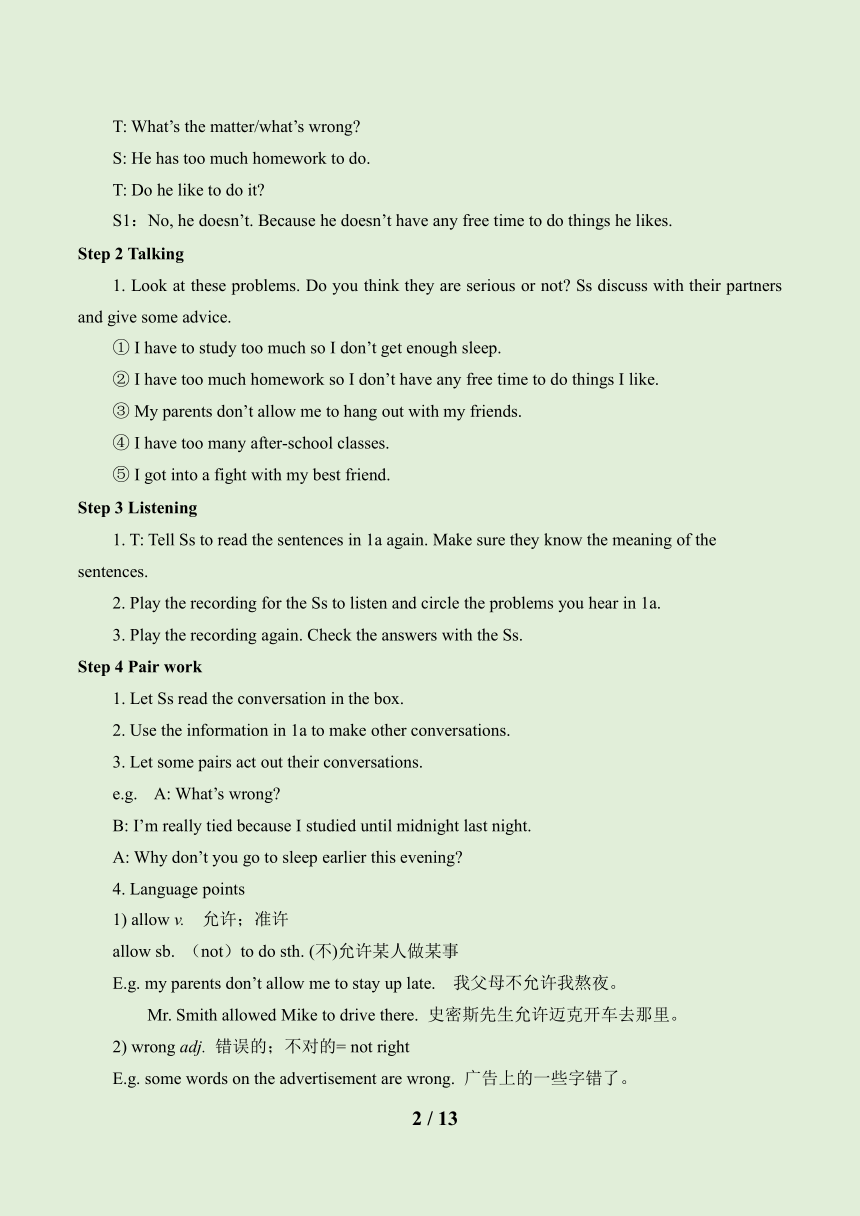
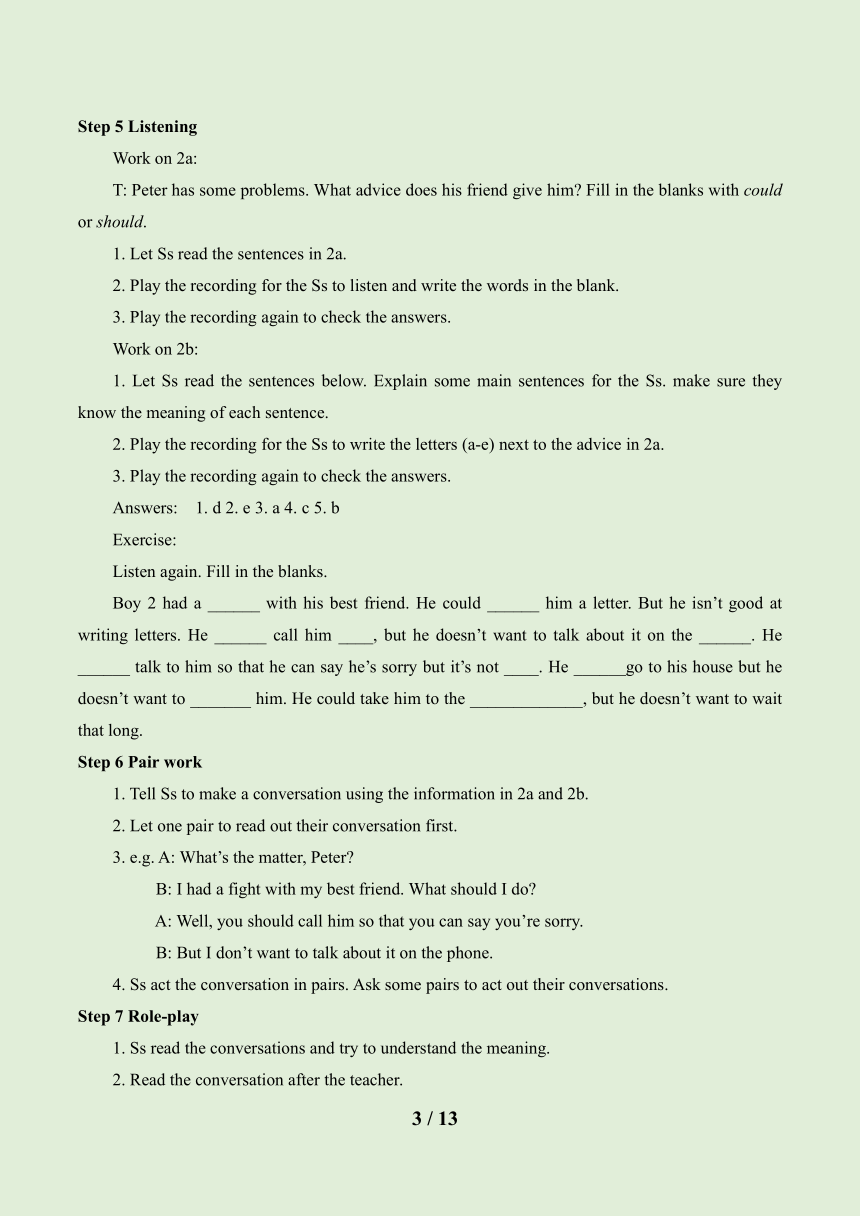
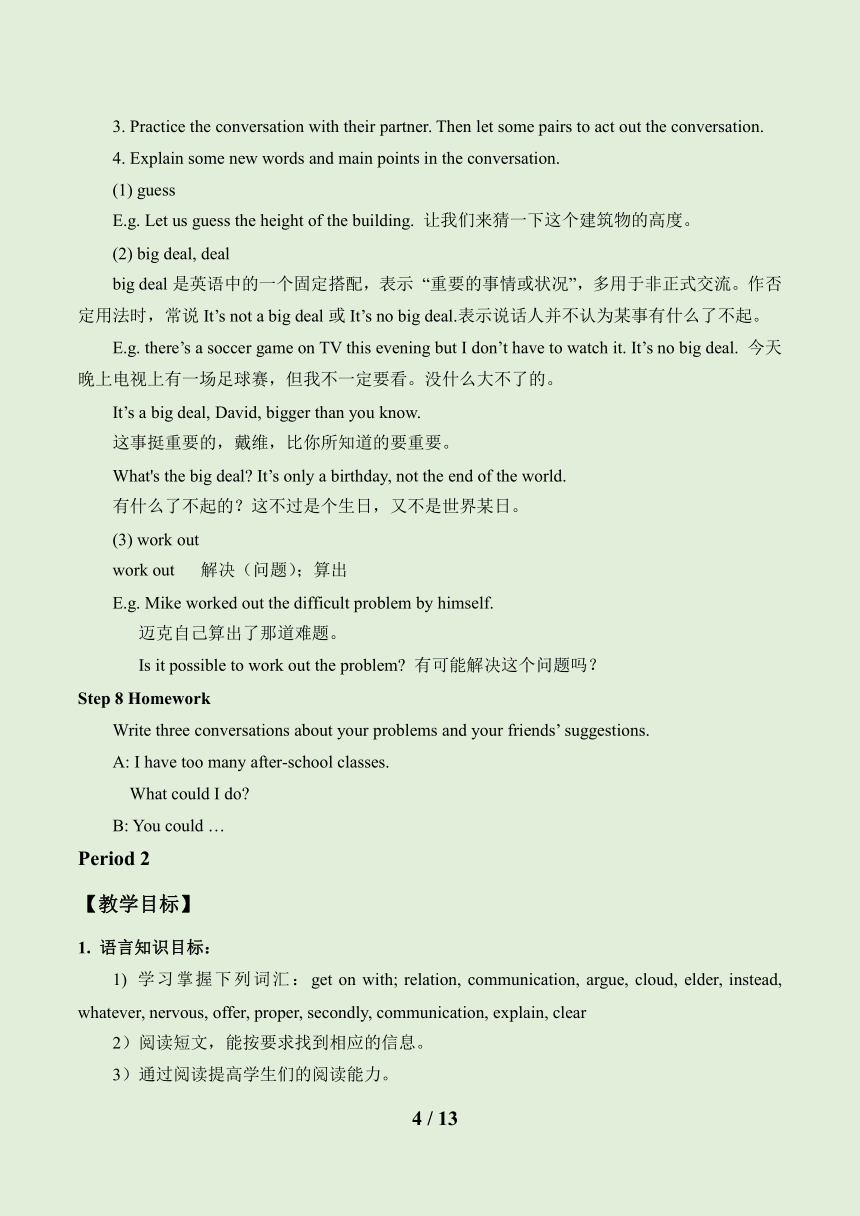
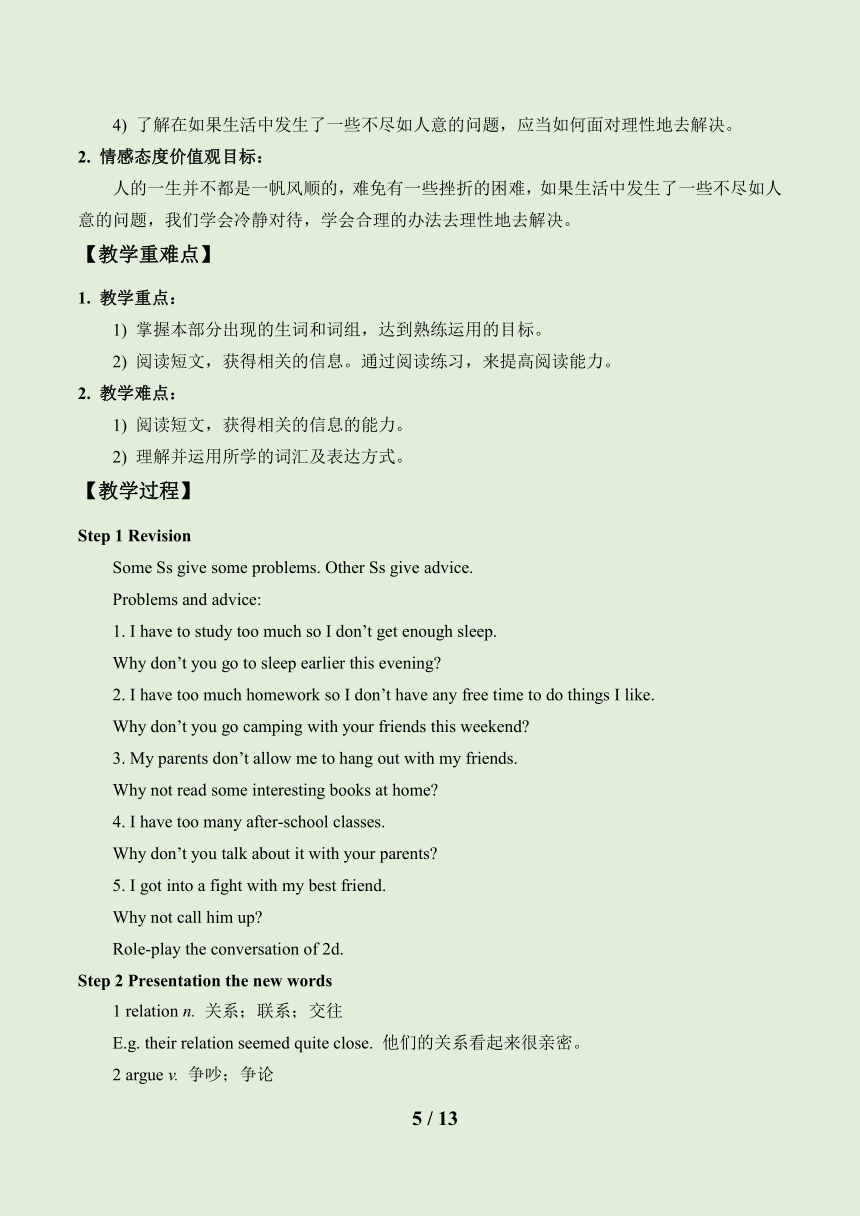
文档简介
Unit 4 Why don’t you talk to your parents
Period 1
【教学目标】
1. 语言知识目标:
1) 能掌握以下单词:allow, wrong, guess, deal, work out
能掌握以下句型:
① —What’s wrong
—I’m really tried because I studied until midnight last night.
② You could give him a ticket to a ball game.
③ I think you should ask your parents for some money.
④ Why don’t you talk to him about it
2) 能了解以下语法:
(1)能够运用所学知识谈论问题和困难、提出建议并做出选择;
(2)能根据对方所提出的问题,给出一些合理的建议。
2. 情感态度价值观目标:
培养学生良好的合作意识,鼓励学生大胆表达自己的想法和意愿。正确认识生活中的一些困难,能采用正确的方式解决生活中的问题。
【教学重难点】
1. 教学重点:
1) Talk about the problems.
2) Learn the new language points.
2. 教学难点:
能根据对方所提出的问题,给出一些合理的建议。
学会表达建议的一些方式。
【教学过程】
Step 1 Warming up
1. 导入学生们平时在学校和生活中存在的问题。
T: What’s the matter/what’s wrong
S: He has too much homework to do.
T: Do he like to do it
S1:No, he doesn’t. Because he doesn’t have any free time to do things he likes.
Step 2 Talking
1. Look at these problems. Do you think they are serious or not Ss discuss with their partners and give some advice.
① I have to study too much so I don’t get enough sleep.
② I have too much homework so I don’t have any free time to do things I like.
③ My parents don’t allow me to hang out with my friends.
④ I have too many after-school classes.
⑤ I got into a fight with my best friend.
Step 3 Listening
1. T: Tell Ss to read the sentences in 1a again. Make sure they know the meaning of the
sentences.
2. Play the recording for the Ss to listen and circle the problems you hear in 1a.
3. Play the recording again. Check the answers with the Ss.
Step 4 Pair work
1. Let Ss read the conversation in the box.
2. Use the information in 1a to make other conversations.
3. Let some pairs act out their conversations.
e.g. A: What’s wrong
B: I’m really tied because I studied until midnight last night.
A: Why don’t you go to sleep earlier this evening
4. Language points
1) allow v. 允许;准许
allow sb. (not)to do sth. (不)允许某人做某事
E.g. my parents don’t allow me to stay up late. 我父母不允许我熬夜。
Mr. Smith allowed Mike to drive there. 史密斯先生允许迈克开车去那里。
2) wrong adj. 错误的;不对的= not right
E.g. some words on the advertisement are wrong. 广告上的一些字错了。
Step 5 Listening
Work on 2a:
T: Peter has some problems. What advice does his friend give him Fill in the blanks with could or should.
1. Let Ss read the sentences in 2a.
2. Play the recording for the Ss to listen and write the words in the blank.
3. Play the recording again to check the answers.
Work on 2b:
1. Let Ss read the sentences below. Explain some main sentences for the Ss. make sure they know the meaning of each sentence.
2. Play the recording for the Ss to write the letters (a-e) next to the advice in 2a.
3. Play the recording again to check the answers.
Answers: 1. d 2. e 3. a 4. c 5. b
Exercise:
Listen again. Fill in the blanks.
Boy 2 had a ______ with his best friend. He could ______ him a letter. But he isn’t good at writing letters. He ______ call him ____, but he doesn’t want to talk about it on the ______. He ______ talk to him so that he can say he’s sorry but it’s not ____. He ______go to his house but he doesn’t want to _______ him. He could take him to the _____________, but he doesn’t want to wait that long.
Step 6 Pair work
1. Tell Ss to make a conversation using the information in 2a and 2b.
2. Let one pair to read out their conversation first.
3. e.g. A: What’s the matter, Peter
B: I had a fight with my best friend. What should I do
A: Well, you should call him so that you can say you’re sorry.
B: But I don’t want to talk about it on the phone.
4. Ss act the conversation in pairs. Ask some pairs to act out their conversations.
Step 7 Role-play
1. Ss read the conversations and try to understand the meaning.
2. Read the conversation after the teacher.
3. Practice the conversation with their partner. Then let some pairs to act out the conversation.
4. Explain some new words and main points in the conversation.
(1) guess
E.g. Let us guess the height of the building. 让我们来猜一下这个建筑物的高度。
(2) big deal, deal
big deal是英语中的一个固定搭配,表示 “重要的事情或状况”,多用于非正式交流。作否定用法时,常说It’s not a big deal或It’s no big deal.表示说话人并不认为某事有什么了不起。
E.g. there’s a soccer game on TV this evening but I don’t have to watch it. It’s no big deal. 今天晚上电视上有一场足球赛,但我不一定要看。没什么大不了的。
It’s a big deal, David, bigger than you know.
这事挺重要的,戴维,比你所知道的要重要。
What's the big deal It’s only a birthday, not the end of the world.
有什么了不起的?这不过是个生日,又不是世界某日。
(3) work out
work out 解决(问题);算出
E.g. Mike worked out the difficult problem by himself.
迈克自己算出了那道难题。
Is it possible to work out the problem 有可能解决这个问题吗?
Step 8 Homework
Write three conversations about your problems and your friends’ suggestions.
A: I have too many after-school classes.
What could I do
B: You could …
Period 2
【教学目标】
1. 语言知识目标:
1) 学习掌握下列词汇:get on with; relation, communication, argue, cloud, elder, instead, whatever, nervous, offer, proper, secondly, communication, explain, clear
2)阅读短文,能按要求找到相应的信息。
3)通过阅读提高学生们的阅读能力。
4) 了解在如果生活中发生了一些不尽如人意的问题,应当如何面对理性地去解决。
2. 情感态度价值观目标:
人的一生并不都是一帆风顺的,难免有一些挫折的困难,如果生活中发生了一些不尽如人意的问题,我们学会冷静对待,学会合理的办法去理性地去解决。
【教学重难点】
1. 教学重点:
1) 掌握本部分出现的生词和词组,达到熟练运用的目标。
2) 阅读短文,获得相关的信息。通过阅读练习,来提高阅读能力。
2. 教学难点:
1) 阅读短文,获得相关的信息的能力。
2) 理解并运用所学的词汇及表达方式。
【教学过程】
Step 1 Revision
Some Ss give some problems. Other Ss give advice.
Problems and advice:
1. I have to study too much so I don’t get enough sleep.
Why don’t you go to sleep earlier this evening
2. I have too much homework so I don’t have any free time to do things I like.
Why don’t you go camping with your friends this weekend
3. My parents don’t allow me to hang out with my friends.
Why not read some interesting books at home
4. I have too many after-school classes.
Why don’t you talk about it with your parents
5. I got into a fight with my best friend.
Why not call him up
Role-play the conversation of 2d.
Step 2 Presentation the new words
1 relation n. 关系;联系;交往
E.g. their relation seemed quite close. 他们的关系看起来很亲密。
2 argue v. 争吵;争论
E.g. the couple began to argue about the child’s education.
那对夫妇开始就孩子的教育问题争吵。
3 proper adj. 正确的;恰当的
E.g. it’s not proper to visit a friend too late in the evening.
太晚了,去看朋友不合适。
4 nervous adj. 焦虑的;担忧的
e.g. don’t be nervous. It is just a small test. 不要紧张。就是个小测试而已。
5 clear adj. 清楚易懂的;晴朗的
E.g. the sun shone out of a clear sky. 天空晴朗,阳光灿烂。
Step 3 Lead in
通过问答一些有关家庭生活的问题来导入正题:
1. Can you get on well with your family
2. Are the relations between your parents good
3. Do you have any brothers or sisters Can you get on well with him/her
4. Who do you ask for help when you have problems
Step 4 Reading
Work on 3a:
1. Tell Ss to read the article in 3a quickly and try to find the answers to these questions:
What’s Sad and Thirteen’s problem
How does he feel at home
方法指导:带着问题,然后快速阅读短文,争取在较短的时间内,找到答案。
学生们,按老师指导的方法进行阅读,并快速回答这两个问题。最后,教师让部分学生回答答案,并校对答案。
2. Ss read the article again and fill in the chart.
学生们认真阅读短文,并在表格中填出男孩Sad and Thirteen面临的问题,并填写出罗波特先生所给出的建议。和同学们一起校对答案。
3. Ss read the article again and fill in the blanks.
Work on 3b:
1. 让学生们讨论罗波特先生对问题的建议,并发表自己的看法。
2. 学生们分小组讨论,发表自己的意见,由小组长汇总。
3. 让小组长并汇总的意见和其他同学汇报。
S1: I agree with his advice. Because more communication can make family members understand each other better and know about the feeling they have.
S2: I don’t agree with his advice. I think their parents should fight any more. They should care more about their children and spend more time with them.
Work on 3c
1. 告诉学生们本学习活动的要求:找出短文与下列词汇意思相同的句子。
2. 让学生们先读3c中的词汇,理解其意思,然后再在短文找出与其意思相同的词汇或词组。
3. 方法指导:根据上下文的意思,来确定词汇或词组的意思。
4. Check the answers。
5. 让学生们用这些词汇或词组造句子。
make sth. clear — explain
Can you explain to me how to do this math problem
talk — _____________ __________________________________
not allow — _______ ___________________________________
worried — ________ __________________________________
get along with — ______________ ___________________________________
Step 5 Language points
1. My problem is that I can’t get on with my family.
get on with 和睦相处;关系良好 相当于 get along with
E.g. the child doesn’t get on well with others. 那个小孩不合群。
2. Instead he watches whatever he wants until late at night.
1) Instead adv. 代替;反而;却
E.g. If we can’t go to Huashan Mountain, we’ll go to the city of Xi’an for the trip.
如果我们不能去爬华山,我们就去西安游玩。
辨析:
instead 是副词,常置于句子末尾。
instead of 是介词短语,后接名词、代词、动名词等。
例如:
Last summer I went to Qingdao.
This summer I’m going to Dalian instead.
去年夏天我去了青岛。今年夏天我要去大连。
Instead of going to Qingdao I’m going to Dalian this year.
今年我打算去大连,而不去青岛。
2) Whatever pron. 任何;无论什么 相当于 no matter what
E.g. Whatever I suggest, he always disagrees.
无论我提什么建议,他都不同意。
3. If your parents are having problems, you should offer to help.
Offer v. 主动提出;自愿给予
offer侧重主动或愿意给予,主动提出做某事。常用结构:offer sb. sth. 或offer to do sth.
E.g. she offered me a cup of tea. 她给我端了杯茶。
He offered to go instead of me. 他主动提出代替我去。
4. Secondly, why don’t you sit down and communicate with your brother
communicate v. 交流;沟通
communicate with sb. 与某人交流
E.g. Li Mei can easily communicate with foreigners in English.
李梅能用英语与外国人轻松交流。
5. Can you explain to me how to do this math problem
explain v. 解释;说明
a. explain + that / what/ why 等从句
b. explain sth. (To sb.)(向某人)解释某事
E.g. Can you explain what this means
你能解释一下这个的意思吗?
Please explain it to me.
请你向我解释一下吧。…
Step 6 Exercises
If time is enough, do some more exercises on big screen.
一、选词填空
instead, argue, nervous, proper, explain
1. My cousin is _______ in front of strangers.
2. He could not come up with a ______answer.
3. The TV shows are boring. Why not play cards _______
4. I don’t want to _______with you. It’s waste of time.
5. Please _______ to her how to use a computer.
二、用括号中单词的适当形式填空。
1. All the ______________ (communicate) with the outside world was broken.
2. Jim is a doctor. His ________ (old) brother is an engineer.
3. After high school Mike got a job instead of ________ (go) to university.
4. Its very kind of you to offer _______ (help) us on the weekend.
5. To begin with we don’t have much money, ________ (second) we are too busy.
Step 7 Homework
1. Read the article several times after school.
2. Make sentences with these words: argue; whatever; instead; nervous; explain; offer to do sth. ; communicate with…
Period 3
(Grammar Focus-4c)
【教学目标】
1. 语言知识目标
1) 学习掌握下列词汇:copy, return
2)进行一步复习巩固学习Section A 部分所学的生词和词组。
3)对询问困难及提出的建议的句型,掌握其规则。
4) 通过不同方式的练习,来熟练运用询问及提建议的表达方式。
2. 情感态度价值观目标:
让学生了解每个人在生活中都有可能遇到一些挫折和不幸,我们多去向那些不幸和困难的人们多表示自己的爱心,多去理解和帮助他们,多向他们提出解决问题的建议而不是去嘲笑他们。
【教学重难点】
1. 教学重点:
1) 复习巩固Section A 部分所学的生词和词组,达到熟练运用的目标。
2) 熟练掌握和运用询问困难和提建议的表达方式。
2. 教学难点:
1) 总结询问问题和提出建议的句型,掌握规则。
2) 练习运用所学的句型。
【教学过程】
Step 1 Warming- up and revision
1. Have a dictation of the new words learned in the last class.
make sth. clear (同义词) ___________
a) talk (同义词) _______________
b) not allow (同义词) ______________
c) worried (同义词) ______________
d) get along with (同义词) ____________
e) communicate (名词)_____________
f) old (比较级) _______________
2. Check the homework.
3. Let some Ss read the article in 3a. Then finish the short passage about Sad and Thirteen.
Sad and Thirteen has some _________. He can’t __________his family. His parent’s _____ a lot. It’s the only _____________ they have. When they _____, it’s like a big black cloud ____________their home. He doesn’t like it.
His brother always watches whatever he wants until midnight. He _______ to let him watch his favorite TV show. So He always feels ______ and ________ at home.
Robert Hunt thinks Sad and thirteen should _________ these feelings to his family. He should ____ to help. Maybe he _________ _____ jobs around the house so that they have more time _______________________. Second, he could sit down and ____________ ____ his brother. He could ________ that he _________ him watching TV all the time, however, he should let him watch his _____________.
Step 2 Grammar Focus.
1. 学生阅读Grammar Focus中的句子,然后做填空练习。
① 你看上去很疲劳,怎么了?
You ____ tired. What’s _____ _______
② 昨晚,我一直学习到午夜,因此我没有睡足觉。
I studied _____ _________ last night so I didn’t ___ ______ sleep.
③ 我应该做什么? ________ ____I do
你为什么不忘掉此事呢?尽管她错了,但那不是一件大事。
_____ ____ you forget about it ______she’s wrong. It’s not _____ _____ ______.
④他应当如何做?
_______ _______ he do
⑤ 他应当和他的朋友交谈一下,以便于他能向他道谦。
He _____ _____ _____ his friends ____ ___ he can say he’s sorry.
⑥ 或许你应当去他家。
_______you______ go to his house.
⑦ 我想我可以,但是我不想让他吃惊。
I think I_______, but I don’t want to _______ _________.
2. 学生们根据记忆,看大屏幕来完成填空练习。
3. 学生们完成填空试题后,可以打开课本检查答案,对错误的句子,单独进行强化记忆。
Step 3 Try to Find
一、提出建议
1.掌握提出问题的方法,
What’s wrong
What’s the matter with sb.
What’s the problem/the trouble
并能讨论所给出的建议。
情态动词should, should等
should,shouldn’t “(不)应该”,常用来提出请求和建议
could “可以”可也用来给出建议。
表建议的句型:
You should/could +v.
Why don’t you + v.
Why not + v.
Could you please + v.
You’d better (not) + v..
Would you mind doing……
What about/How about + n./doing……
Exercise:
一、用所给单词的适当形式填空
1. We shouldn’t_______ (argue) with our parents.
2. You shouldn’t____ (use) the phone in the classroom.
3.—could I use your dictionary
—well, you___.
A. can B. could C. should D. might
4. You’d better___ (go) to school by bike.
5. How about_________ (go) hiking this afternoon
Step 4 New Words
Look at the big screen and learn the new words and expressions:
copy v. 复制;复印
It’s not good habits to copy other’s homework.
抄袭别人的作业不是好习惯。
return v. 回来;回去
They didn’t return until yesterday afternoon. 直到昨天下午他们才回家。
Step 5 Practice
Work on 4a:
1. Fill in the blanks with although, so that or until.
2. 方法指导:
1)so that; 点拨:so that 意为“因此”,引导目的状语从句,表示前一句所表述的动作的目的。在从句中常使用can/could/will/may/should等词。
拓展:so… that… 意为“如此……以至于”,常用于结果状语从句,表示上文动作所产生 结果。
2) 点拨:though 意为“尽管……但是”,不能说,though…but。句意“尽管你现在没有朋友,但不久你就会有朋友的。”
3)点拨:until 用于否定句中,表示句子的动作直到until短语所表示的时间才开始发生,即表示动作的起点。一般译为“直到……才”。
4)点拨:句意“尽管他是你的最好的朋友,但你还是应当告诉他,抄袭别人的作业是不对的。”,可知空格处应用though 。
Step 6 Giving advice.
Work on 4c.
1. 让学生们阅读表格中的问题,明确每个问题的意思,为进行讨论做好准备。
2. 和同学们讨论一下如何解决这些问题,或某个问题。
3. 找到一个较为合理的建议。
4. 最后,向同班同学们展示自己的想法建议。
Step 7 Homework
用下列词组造句
put up, hand out, call up, cheer up, come up with, give out, put off
PAGE
3 / 13
Period 1
【教学目标】
1. 语言知识目标:
1) 能掌握以下单词:allow, wrong, guess, deal, work out
能掌握以下句型:
① —What’s wrong
—I’m really tried because I studied until midnight last night.
② You could give him a ticket to a ball game.
③ I think you should ask your parents for some money.
④ Why don’t you talk to him about it
2) 能了解以下语法:
(1)能够运用所学知识谈论问题和困难、提出建议并做出选择;
(2)能根据对方所提出的问题,给出一些合理的建议。
2. 情感态度价值观目标:
培养学生良好的合作意识,鼓励学生大胆表达自己的想法和意愿。正确认识生活中的一些困难,能采用正确的方式解决生活中的问题。
【教学重难点】
1. 教学重点:
1) Talk about the problems.
2) Learn the new language points.
2. 教学难点:
能根据对方所提出的问题,给出一些合理的建议。
学会表达建议的一些方式。
【教学过程】
Step 1 Warming up
1. 导入学生们平时在学校和生活中存在的问题。
T: What’s the matter/what’s wrong
S: He has too much homework to do.
T: Do he like to do it
S1:No, he doesn’t. Because he doesn’t have any free time to do things he likes.
Step 2 Talking
1. Look at these problems. Do you think they are serious or not Ss discuss with their partners and give some advice.
① I have to study too much so I don’t get enough sleep.
② I have too much homework so I don’t have any free time to do things I like.
③ My parents don’t allow me to hang out with my friends.
④ I have too many after-school classes.
⑤ I got into a fight with my best friend.
Step 3 Listening
1. T: Tell Ss to read the sentences in 1a again. Make sure they know the meaning of the
sentences.
2. Play the recording for the Ss to listen and circle the problems you hear in 1a.
3. Play the recording again. Check the answers with the Ss.
Step 4 Pair work
1. Let Ss read the conversation in the box.
2. Use the information in 1a to make other conversations.
3. Let some pairs act out their conversations.
e.g. A: What’s wrong
B: I’m really tied because I studied until midnight last night.
A: Why don’t you go to sleep earlier this evening
4. Language points
1) allow v. 允许;准许
allow sb. (not)to do sth. (不)允许某人做某事
E.g. my parents don’t allow me to stay up late. 我父母不允许我熬夜。
Mr. Smith allowed Mike to drive there. 史密斯先生允许迈克开车去那里。
2) wrong adj. 错误的;不对的= not right
E.g. some words on the advertisement are wrong. 广告上的一些字错了。
Step 5 Listening
Work on 2a:
T: Peter has some problems. What advice does his friend give him Fill in the blanks with could or should.
1. Let Ss read the sentences in 2a.
2. Play the recording for the Ss to listen and write the words in the blank.
3. Play the recording again to check the answers.
Work on 2b:
1. Let Ss read the sentences below. Explain some main sentences for the Ss. make sure they know the meaning of each sentence.
2. Play the recording for the Ss to write the letters (a-e) next to the advice in 2a.
3. Play the recording again to check the answers.
Answers: 1. d 2. e 3. a 4. c 5. b
Exercise:
Listen again. Fill in the blanks.
Boy 2 had a ______ with his best friend. He could ______ him a letter. But he isn’t good at writing letters. He ______ call him ____, but he doesn’t want to talk about it on the ______. He ______ talk to him so that he can say he’s sorry but it’s not ____. He ______go to his house but he doesn’t want to _______ him. He could take him to the _____________, but he doesn’t want to wait that long.
Step 6 Pair work
1. Tell Ss to make a conversation using the information in 2a and 2b.
2. Let one pair to read out their conversation first.
3. e.g. A: What’s the matter, Peter
B: I had a fight with my best friend. What should I do
A: Well, you should call him so that you can say you’re sorry.
B: But I don’t want to talk about it on the phone.
4. Ss act the conversation in pairs. Ask some pairs to act out their conversations.
Step 7 Role-play
1. Ss read the conversations and try to understand the meaning.
2. Read the conversation after the teacher.
3. Practice the conversation with their partner. Then let some pairs to act out the conversation.
4. Explain some new words and main points in the conversation.
(1) guess
E.g. Let us guess the height of the building. 让我们来猜一下这个建筑物的高度。
(2) big deal, deal
big deal是英语中的一个固定搭配,表示 “重要的事情或状况”,多用于非正式交流。作否定用法时,常说It’s not a big deal或It’s no big deal.表示说话人并不认为某事有什么了不起。
E.g. there’s a soccer game on TV this evening but I don’t have to watch it. It’s no big deal. 今天晚上电视上有一场足球赛,但我不一定要看。没什么大不了的。
It’s a big deal, David, bigger than you know.
这事挺重要的,戴维,比你所知道的要重要。
What's the big deal It’s only a birthday, not the end of the world.
有什么了不起的?这不过是个生日,又不是世界某日。
(3) work out
work out 解决(问题);算出
E.g. Mike worked out the difficult problem by himself.
迈克自己算出了那道难题。
Is it possible to work out the problem 有可能解决这个问题吗?
Step 8 Homework
Write three conversations about your problems and your friends’ suggestions.
A: I have too many after-school classes.
What could I do
B: You could …
Period 2
【教学目标】
1. 语言知识目标:
1) 学习掌握下列词汇:get on with; relation, communication, argue, cloud, elder, instead, whatever, nervous, offer, proper, secondly, communication, explain, clear
2)阅读短文,能按要求找到相应的信息。
3)通过阅读提高学生们的阅读能力。
4) 了解在如果生活中发生了一些不尽如人意的问题,应当如何面对理性地去解决。
2. 情感态度价值观目标:
人的一生并不都是一帆风顺的,难免有一些挫折的困难,如果生活中发生了一些不尽如人意的问题,我们学会冷静对待,学会合理的办法去理性地去解决。
【教学重难点】
1. 教学重点:
1) 掌握本部分出现的生词和词组,达到熟练运用的目标。
2) 阅读短文,获得相关的信息。通过阅读练习,来提高阅读能力。
2. 教学难点:
1) 阅读短文,获得相关的信息的能力。
2) 理解并运用所学的词汇及表达方式。
【教学过程】
Step 1 Revision
Some Ss give some problems. Other Ss give advice.
Problems and advice:
1. I have to study too much so I don’t get enough sleep.
Why don’t you go to sleep earlier this evening
2. I have too much homework so I don’t have any free time to do things I like.
Why don’t you go camping with your friends this weekend
3. My parents don’t allow me to hang out with my friends.
Why not read some interesting books at home
4. I have too many after-school classes.
Why don’t you talk about it with your parents
5. I got into a fight with my best friend.
Why not call him up
Role-play the conversation of 2d.
Step 2 Presentation the new words
1 relation n. 关系;联系;交往
E.g. their relation seemed quite close. 他们的关系看起来很亲密。
2 argue v. 争吵;争论
E.g. the couple began to argue about the child’s education.
那对夫妇开始就孩子的教育问题争吵。
3 proper adj. 正确的;恰当的
E.g. it’s not proper to visit a friend too late in the evening.
太晚了,去看朋友不合适。
4 nervous adj. 焦虑的;担忧的
e.g. don’t be nervous. It is just a small test. 不要紧张。就是个小测试而已。
5 clear adj. 清楚易懂的;晴朗的
E.g. the sun shone out of a clear sky. 天空晴朗,阳光灿烂。
Step 3 Lead in
通过问答一些有关家庭生活的问题来导入正题:
1. Can you get on well with your family
2. Are the relations between your parents good
3. Do you have any brothers or sisters Can you get on well with him/her
4. Who do you ask for help when you have problems
Step 4 Reading
Work on 3a:
1. Tell Ss to read the article in 3a quickly and try to find the answers to these questions:
What’s Sad and Thirteen’s problem
How does he feel at home
方法指导:带着问题,然后快速阅读短文,争取在较短的时间内,找到答案。
学生们,按老师指导的方法进行阅读,并快速回答这两个问题。最后,教师让部分学生回答答案,并校对答案。
2. Ss read the article again and fill in the chart.
学生们认真阅读短文,并在表格中填出男孩Sad and Thirteen面临的问题,并填写出罗波特先生所给出的建议。和同学们一起校对答案。
3. Ss read the article again and fill in the blanks.
Work on 3b:
1. 让学生们讨论罗波特先生对问题的建议,并发表自己的看法。
2. 学生们分小组讨论,发表自己的意见,由小组长汇总。
3. 让小组长并汇总的意见和其他同学汇报。
S1: I agree with his advice. Because more communication can make family members understand each other better and know about the feeling they have.
S2: I don’t agree with his advice. I think their parents should fight any more. They should care more about their children and spend more time with them.
Work on 3c
1. 告诉学生们本学习活动的要求:找出短文与下列词汇意思相同的句子。
2. 让学生们先读3c中的词汇,理解其意思,然后再在短文找出与其意思相同的词汇或词组。
3. 方法指导:根据上下文的意思,来确定词汇或词组的意思。
4. Check the answers。
5. 让学生们用这些词汇或词组造句子。
make sth. clear — explain
Can you explain to me how to do this math problem
talk — _____________ __________________________________
not allow — _______ ___________________________________
worried — ________ __________________________________
get along with — ______________ ___________________________________
Step 5 Language points
1. My problem is that I can’t get on with my family.
get on with 和睦相处;关系良好 相当于 get along with
E.g. the child doesn’t get on well with others. 那个小孩不合群。
2. Instead he watches whatever he wants until late at night.
1) Instead adv. 代替;反而;却
E.g. If we can’t go to Huashan Mountain, we’ll go to the city of Xi’an for the trip.
如果我们不能去爬华山,我们就去西安游玩。
辨析:
instead 是副词,常置于句子末尾。
instead of 是介词短语,后接名词、代词、动名词等。
例如:
Last summer I went to Qingdao.
This summer I’m going to Dalian instead.
去年夏天我去了青岛。今年夏天我要去大连。
Instead of going to Qingdao I’m going to Dalian this year.
今年我打算去大连,而不去青岛。
2) Whatever pron. 任何;无论什么 相当于 no matter what
E.g. Whatever I suggest, he always disagrees.
无论我提什么建议,他都不同意。
3. If your parents are having problems, you should offer to help.
Offer v. 主动提出;自愿给予
offer侧重主动或愿意给予,主动提出做某事。常用结构:offer sb. sth. 或offer to do sth.
E.g. she offered me a cup of tea. 她给我端了杯茶。
He offered to go instead of me. 他主动提出代替我去。
4. Secondly, why don’t you sit down and communicate with your brother
communicate v. 交流;沟通
communicate with sb. 与某人交流
E.g. Li Mei can easily communicate with foreigners in English.
李梅能用英语与外国人轻松交流。
5. Can you explain to me how to do this math problem
explain v. 解释;说明
a. explain + that / what/ why 等从句
b. explain sth. (To sb.)(向某人)解释某事
E.g. Can you explain what this means
你能解释一下这个的意思吗?
Please explain it to me.
请你向我解释一下吧。…
Step 6 Exercises
If time is enough, do some more exercises on big screen.
一、选词填空
instead, argue, nervous, proper, explain
1. My cousin is _______ in front of strangers.
2. He could not come up with a ______answer.
3. The TV shows are boring. Why not play cards _______
4. I don’t want to _______with you. It’s waste of time.
5. Please _______ to her how to use a computer.
二、用括号中单词的适当形式填空。
1. All the ______________ (communicate) with the outside world was broken.
2. Jim is a doctor. His ________ (old) brother is an engineer.
3. After high school Mike got a job instead of ________ (go) to university.
4. Its very kind of you to offer _______ (help) us on the weekend.
5. To begin with we don’t have much money, ________ (second) we are too busy.
Step 7 Homework
1. Read the article several times after school.
2. Make sentences with these words: argue; whatever; instead; nervous; explain; offer to do sth. ; communicate with…
Period 3
(Grammar Focus-4c)
【教学目标】
1. 语言知识目标
1) 学习掌握下列词汇:copy, return
2)进行一步复习巩固学习Section A 部分所学的生词和词组。
3)对询问困难及提出的建议的句型,掌握其规则。
4) 通过不同方式的练习,来熟练运用询问及提建议的表达方式。
2. 情感态度价值观目标:
让学生了解每个人在生活中都有可能遇到一些挫折和不幸,我们多去向那些不幸和困难的人们多表示自己的爱心,多去理解和帮助他们,多向他们提出解决问题的建议而不是去嘲笑他们。
【教学重难点】
1. 教学重点:
1) 复习巩固Section A 部分所学的生词和词组,达到熟练运用的目标。
2) 熟练掌握和运用询问困难和提建议的表达方式。
2. 教学难点:
1) 总结询问问题和提出建议的句型,掌握规则。
2) 练习运用所学的句型。
【教学过程】
Step 1 Warming- up and revision
1. Have a dictation of the new words learned in the last class.
make sth. clear (同义词) ___________
a) talk (同义词) _______________
b) not allow (同义词) ______________
c) worried (同义词) ______________
d) get along with (同义词) ____________
e) communicate (名词)_____________
f) old (比较级) _______________
2. Check the homework.
3. Let some Ss read the article in 3a. Then finish the short passage about Sad and Thirteen.
Sad and Thirteen has some _________. He can’t __________his family. His parent’s _____ a lot. It’s the only _____________ they have. When they _____, it’s like a big black cloud ____________their home. He doesn’t like it.
His brother always watches whatever he wants until midnight. He _______ to let him watch his favorite TV show. So He always feels ______ and ________ at home.
Robert Hunt thinks Sad and thirteen should _________ these feelings to his family. He should ____ to help. Maybe he _________ _____ jobs around the house so that they have more time _______________________. Second, he could sit down and ____________ ____ his brother. He could ________ that he _________ him watching TV all the time, however, he should let him watch his _____________.
Step 2 Grammar Focus.
1. 学生阅读Grammar Focus中的句子,然后做填空练习。
① 你看上去很疲劳,怎么了?
You ____ tired. What’s _____ _______
② 昨晚,我一直学习到午夜,因此我没有睡足觉。
I studied _____ _________ last night so I didn’t ___ ______ sleep.
③ 我应该做什么? ________ ____I do
你为什么不忘掉此事呢?尽管她错了,但那不是一件大事。
_____ ____ you forget about it ______she’s wrong. It’s not _____ _____ ______.
④他应当如何做?
_______ _______ he do
⑤ 他应当和他的朋友交谈一下,以便于他能向他道谦。
He _____ _____ _____ his friends ____ ___ he can say he’s sorry.
⑥ 或许你应当去他家。
_______you______ go to his house.
⑦ 我想我可以,但是我不想让他吃惊。
I think I_______, but I don’t want to _______ _________.
2. 学生们根据记忆,看大屏幕来完成填空练习。
3. 学生们完成填空试题后,可以打开课本检查答案,对错误的句子,单独进行强化记忆。
Step 3 Try to Find
一、提出建议
1.掌握提出问题的方法,
What’s wrong
What’s the matter with sb.
What’s the problem/the trouble
并能讨论所给出的建议。
情态动词should, should等
should,shouldn’t “(不)应该”,常用来提出请求和建议
could “可以”可也用来给出建议。
表建议的句型:
You should/could +v.
Why don’t you + v.
Why not + v.
Could you please + v.
You’d better (not) + v..
Would you mind doing……
What about/How about + n./doing……
Exercise:
一、用所给单词的适当形式填空
1. We shouldn’t_______ (argue) with our parents.
2. You shouldn’t____ (use) the phone in the classroom.
3.—could I use your dictionary
—well, you___.
A. can B. could C. should D. might
4. You’d better___ (go) to school by bike.
5. How about_________ (go) hiking this afternoon
Step 4 New Words
Look at the big screen and learn the new words and expressions:
copy v. 复制;复印
It’s not good habits to copy other’s homework.
抄袭别人的作业不是好习惯。
return v. 回来;回去
They didn’t return until yesterday afternoon. 直到昨天下午他们才回家。
Step 5 Practice
Work on 4a:
1. Fill in the blanks with although, so that or until.
2. 方法指导:
1)so that; 点拨:so that 意为“因此”,引导目的状语从句,表示前一句所表述的动作的目的。在从句中常使用can/could/will/may/should等词。
拓展:so… that… 意为“如此……以至于”,常用于结果状语从句,表示上文动作所产生 结果。
2) 点拨:though 意为“尽管……但是”,不能说,though…but。句意“尽管你现在没有朋友,但不久你就会有朋友的。”
3)点拨:until 用于否定句中,表示句子的动作直到until短语所表示的时间才开始发生,即表示动作的起点。一般译为“直到……才”。
4)点拨:句意“尽管他是你的最好的朋友,但你还是应当告诉他,抄袭别人的作业是不对的。”,可知空格处应用though 。
Step 6 Giving advice.
Work on 4c.
1. 让学生们阅读表格中的问题,明确每个问题的意思,为进行讨论做好准备。
2. 和同学们讨论一下如何解决这些问题,或某个问题。
3. 找到一个较为合理的建议。
4. 最后,向同班同学们展示自己的想法建议。
Step 7 Homework
用下列词组造句
put up, hand out, call up, cheer up, come up with, give out, put off
PAGE
3 / 13
同课章节目录
- Unit 1 What's the matter?
- Section A
- Section B
- Unit 2 I'll help to clean up the city parks.
- Section A
- Section B
- Unit 3 Could you please clean your room?
- Section A
- Section B
- Unit 4 Why don't you talk to your parents?
- Section A
- Section B
- Unit 5 What were you doing when the rainstorm came
- Section A
- Section B
- Review of Units 1-5
- Unit 6 An old man tried to move the mountains.
- Section A
- Section B
- Unit 7 What's the highest mountain in the world?
- Section A
- Section B
- Unit 8 Have you read Treasure Island yet?
- Section A
- Section B
- Unit 9 Have you ever been to a museum?
- Section A
- Section B
- Unit 10 I've had this bike for three years.
- Section A
- Section B
